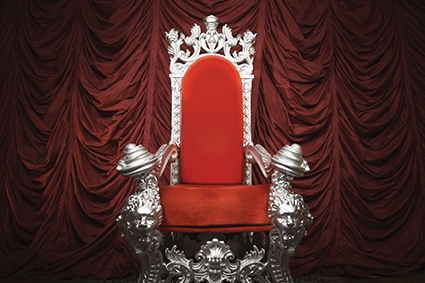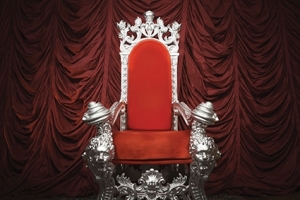King or No King? That Is the Question
What ought a small post-Soviet country with Euro-Atlantic aspirations do to further boost its claims that it belongs in the European family? Well, introducing a constitutional monarchy isn’t exactly the first idea to spring anyone’s mind – and yet Patriarch Ilia II voiced just that, in the belief it will bring “calm and stability” to the country. Considering the trust and respect he commands, it was enough to become the talk of the week, up to the highest circles of Georgian politics. So, what would a constitutional monarchy bring to Georgia? Who better to ask this question to than subjects of the world’s oldest constitutional monarchy? Tbilisi-based British journalists and writers, Peter Nasmyth and William Dunbar, were at hand to discuss the topic for GEORGIA TODAY and the Panorama TV Show.
Georgia, beacon of democracy, is thinking to restore the monarchy. Is it necessary?
William Dunbar (WD): I don’t think Georgia wants a monarchy. The last time this question was asked in a reputable survey was in 2009 by CRRC, questioning the type of constitutional arrangement people wanted. 25% of people said ‘semi-presidential republic,’ 4% said ‘constitutional monarchy’ and 34% said ‘don’t know’.
Peter Nasmyth (PN): Probably not. I think the instinct to have a king is in everybody. We like large, powerful leaders which are either physically or symbolically powerful. Psychologically, it’s a useful thing to have an image of a king, though having a physical king is another matter entirely, possibly even dangerous. Because if the king has too much power, then you’re in trouble.
What would the West’s reaction be?
WD: If there was firm separation of powers between the constitutional monarch and the elected government, and as long as the monarchy was completely transparent in terms of financing, and promised to uphold the European values the Georgian government said they are committed to, then I don’t think anyone would complain. At the same time, I think it’s incredibly unlikely. MP Eka Beselia and Parliamentary Speaker Kobakhidze were [last week] saying how important it is to listen to the Patriarch, but they’d probably say that no matter what he said as he is such a respected figure [here].
PN: When I was a journalist back in 1993, the British newspaper Observer sent me to Spain to interview the ‘future king of Georgia’ at his residence Villa Georgia in Puerto Banus: then-Prince Jorje Bagrationi. He never became king, and some would say unfortunately. But it was quite an interesting interview. He’d never been to Georgia, he didn’t speak Georgian, but when we did the interview, he used the royal ‘We’ the whole time which is a hint that he thought that he might have become king. Very shortly after that, Shevardnadze effectively took the role of king and whole project collapsed.
As for the reaction of the West, and the world, I think they would react with interest, not hostility. Personally, I’d be quite interested how expensive it would be to reinstitute the monarchy, because Georgia is not a wealthy country…
Georgian taxpayers would also be interested
PN: There are many kinds of monarchies that could be reinstituted. You can have the grand one, like the British, or a much smaller one, like the Danish, who go around on bicycles. It’s really for you to choose what kind of monarchy you want. It is an interesting proposition and the world would be interested if you did it.
WD: I think the West will be happy if Georgia remains calm and stable and an increasingly democratic place. Whatever Georgia decides, as long as it ends up a predictable, stable and democratic partner, I think no-one will mind.
So, democracy does not exclude a constitutional monarchy?
WD: There’s always tension between the idea of having a hereditary principle and “these people get to live in a nice house and get free money just because they happen to be born into a certain family”. Yes, in essence there is a certain anti-democratic principle to it. But if Georgia increases its level of democracy and its stability and reliability as a partner for Europe and the West, then I don’t think they would object. But I do think many people in Europe might look suspiciously on the fact that the idea was generated by the Patriarch.
Some consider this a step toward theocracy, with the Church getting additional leverage in political matters…
WD: I don’t think there’s a real risk of Georgia becoming a theocracy. It’s unrealistic. Georgia’s developing, becoming more modern socially and culturally. I think the Georgian Orthodox Church and traditional religious pact have a huge and positive role to play in Georgia. I’d just like to them to play that role more transparently. If there was a movement, a large number of people that felt very strongly about the monarchy idea, then I think we’d have a slightly more serious conversation about it. People who worry about this sort of thing would see the Patriarch making the statement and then politicians reacting to it. That’s the sort of power relationship which worries people who are concerned about entrenching democracy in Georgia.
There are lots of conspiracy theories around this idea – one being that it is artificially promoted to shift people’s attention from more important matters, for example, the constitutional changes. Do you agree?
WD: I don’t think it’s conspiracy theory. I think any government in the world would gladly pick up on the topic in order to distract from more difficult ones. But you make a good point that there’s a very important process going on in Georgia’s constitutional settlement right now which has nothing to do with the king but everything to do with the new constitution which looks like it’s going be adopted with a very little consensus. These are things we should be really concerned about. These are things which will chart Georgia’s democratic future over the next 10 years. These are things which Georgia’s European partners are concerned about, too. Once again, if Georgia had a fabulous democratic constitution that ensured pluralism and legitimate balance and separation of powers, and it had a constitutional monarch – great! But the main thing is to ensure democracy and separation of powers and that’s what I’m worried about – constitutional changes, which are much more important than a constitutional monarchy.
But why have a re-electable, potentially troublemaking president when you can have a yay-saying, eternally grateful king for at least 20-30 years? Could this be an attempt to replace the presidency?
PN: I don’t agree with that theory. Certainly not at the moment in Georgia. Maybe in the early 90s when Georgia had no experience of democracy. Now it does and there’s a real possibility that the population wouldn’t buy that any more and for very good reason. Georgia’s opened up; it can see how other countries are responding to and dealing with monarchies. Certainly, Georgia would not go back along that line.
Even if the Patriarch says to do so?
PN: Even if the Patriarch says so. I just don’t believe it right now.
WD: One thing about Georgian politics is that you don’t bet on the guy making trouble. Think what we’ve seen between [President] Margvelashvili and Bidzina Ivanishvili. I’m in favor of that trouble because that’s what the president is meant to do- not just go along with everything. I think lots of Saakashvili’s PMs caused problems for him as well. So, anyone who thinks that you can rely on a single guy for 40 years to be a puppet doesn’t know Georgian history or Georgian politics.
Some MPs from the ruling party said there will be a plebiscite on the issue in autumn. Do you think it should be delayed until the monarchy idea has been properly assessed?
WD: It’s unrealistic. Without wanting to deal with conspiracy theories, it’s entirely possible that the constitutional reform project has developed its own logic, its own teleology, and is rolling on its own without the government really being in control. There’s a lot of conflict within the ruling party about whether we should have majoritarians- they don’t want to lose their jobs, they don’t want to switch to a full proportional system in next elections, etc. As such, perhaps the idea of having a plebiscite about the constitutional monarchy is a nice way of stopping that fight and having another fight instead. But I think it’s unrealistic as there’s no time for political campaigning over the summer.
Is the role of the Church negative or positive on these issues?
PN: Well, I’ll be a little bit hesitant there. I’m not sure religious emotions should not be mixed with political emotions. It should be kept separate, as it helps to maintain a more stable society. It’s a very important role. I’ve seen the Church do marvelous things here, but I don’t think it should get too big.
Vazha Tavberidze












